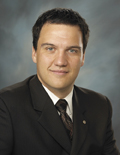Page Content
 Call me weird, but when I was a classroom teacher I actually enjoyed parent–teacher interviews. Granted, I taught high school academic mathematics, and the parent turnout was on the low side (giving me some welcome extra time for planning or prep work). Besides the kids taking academic math were pretty high achievers—not too many problems there.
Call me weird, but when I was a classroom teacher I actually enjoyed parent–teacher interviews. Granted, I taught high school academic mathematics, and the parent turnout was on the low side (giving me some welcome extra time for planning or prep work). Besides the kids taking academic math were pretty high achievers—not too many problems there.
In any case, I always enjoyed meeting with parents and talking to them about how their kids were doing and about my own approach to teaching. I appreciated the opportunity to step back a bit and reflect on my practice as it related to each student. Sometimes parents and I would discuss whether the strategies I was using were working for a particular student, and we would plan how the student, parents and I could work together on solutions when current strategies were not working.
I remember some particularly rewarding conversations about assessment that I used to have with one particular parent. I first thought that Mrs. Zed (not her real name) was challenging my marking methodologies and advocating for changes to her child’s grades, but as I explained the philosophy behind my marking structure, we digressed into a fruitful discussion on assessment theory. As it turned out, Mrs. Zed was doing her own reading on assessment and enjoyed talking to me about the choices that I made in her daughter’s class. We explored issues such as summative and formative assessments, reliability and validity, and the value and limitations of standardized testing.
Parents and teachers have diverse views on the education system and often these differing perspectives are perceived as one person challenging the other. Teachers can get defensive about their position as authorities on pedagogy; whereas parents believe they know their child better than the teacher. However, sometimes both parties operate with limited information; that is, teachers may observe behaviours that are not apparent at home, and parents observe behaviours that are not apparent at school.
When I was a teacher in the classroom, I had no children of my own and perhaps there were times when I might not have truly appreciated a parent’s point of view. Well, all that has changed. I was recently blessed with the arrival of my first child, Beatrice, and already my perspectives on education have shifted.
As a teacher, it’s easy to look on the classroom from a theoretical perspective. I can recognize how a hands-on exploratory activity might benefit students A, B or C, and I can consider how using collaborative group work will benefit students X, Y or Z. But as a parent, the question that I anticipate I’ll be asking more and more is: “How will Beatrice benefit from such assignments?”
Perhaps the hardest part for parents to understand is that the classroom needs to work for 25 students, and the teacher has to account for the needs of all students. Similarly, the hardest part for teachers to understand is that when a significant issue arises for a parent’s child, the other 24 students cease to matter to that parent.
When communicating with parents, this gap in perspectives can be difficult to bridge. Successfully working with parents comes from appreciating and respecting the view of others. When teachers explain that their choices are made in the best interests of students, parents usually come to realize that teachers are there to help students, not hinder them.
I look forward to guiding Beatrice through her lifelong learning journey. I hope she shares the love of learning that I have, and I trust that I’ll work with some fantastic teachers along the way.
Today, I am amazed by the curiosity I see in my daughter’s eyes and I can’t wait to hear her questions about what she sees.
I welcome your comments—contact me at jonathan.teghtmeyer@ata.ab.ca.
